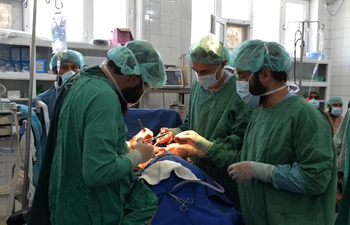
Greek Prime Minister Alexis Tsipras (L) and Finance Minister Euclid Tsakalotos attend a press conference in Athens, Greece, on May 7, 2019. The Greek government announced on Tuesday a package of measures to relieve the burden on taxpayers in the post-bailout era. (Xinhua/Marios Lolos)
ATHENS, May 7 (Xinhua) -- The Greek government announced on Tuesday a package of measures to relieve the burden on taxpayers in the post-bailout era.
Ten months after Greece exited the harsh bailout programs introduced since 2010 to deal with an acute debt crisis, it was time Greek households and businesses felt the results of efforts which led to economic recovery, Greek Prime Minister Alexis Tsipras told a press conference in Athens.
"It is time for those who shouldered the burden, the majority, to taste the fruits of their sacrifices," the Greek leader said during the conference that was broadcast live on Greek national broadcaster ERT.
Currently Greece has a liquidity reservoir of at least 31 billion euros (34.7 billion U.S. dollars) in state coffers, he noted.
The government decided that about 3.6 billion euros of this reserve will go towards early repayment of the International Monetary Fund, thus saving millions of euros annually in interest rates, Tsipras explained.
Another 5.5 billion euros will be put into a special account as collateral against Greece's lenders over the next three years. It will be Athens' guarantee to creditors that they will get the money that corresponds to the level of primary surpluses agreed to be reached by 2022, under the bailouts.
The rest will be invested in growth boosting policies and relief measures.
The set of measures presented on Tuesday include policies which will be legislated this May and will be implemented in 2019, as well as measures that will be legislated later and will be implemented in 2020.
Specifically, the measures to be implemented as of 2019 include the permanently reinstatement of the 13th pension which was cut during the crisis, a reduction of VAT from 13 percent to 11 percent in general goods and services, tax cuts for island residents and further reduction of heating costs in mountainous areas, Greek national news agency AMNA reported.
In addition, VAT on all foods is cut from 24 percent to 13 percent and VAT on electricity and natural gas from 13 percent to 6 percent.
Next year, a so-called "Solidarity tax" introduced during the years of the crisis on annual incomes, will be reduced by up to 3 percentage points for annual incomes up to 30,000 euros, and down to zero percent for incomes under 20,000.
Also, the state will subsidize contributions to social security funds for full time job positions offered to young employees under 30 as part of efforts to further reduce unemployment rates which now stand at around 18 percent.
"For this strategy we are asking for the Greek people's confidence vote on the May 26 European elections and of course the people's approval on the early October 2019 national elections so that we can fully implement it," Tsipras said.
Tsipras' Radical Left SYRIZA party is trailing behind the conservatives in all recent opinion polls for both the European and the national elections.











